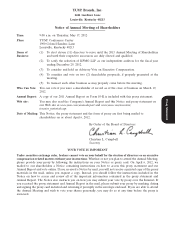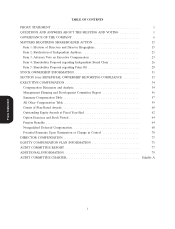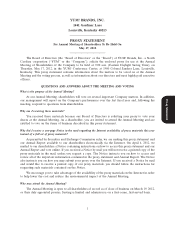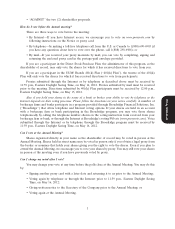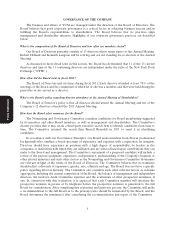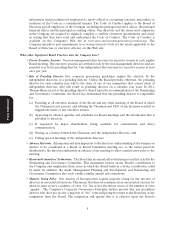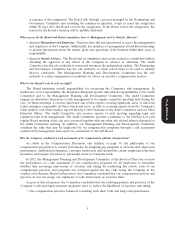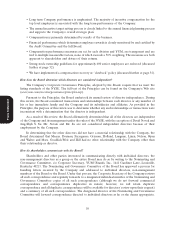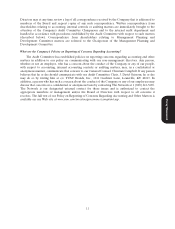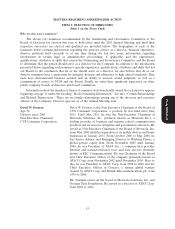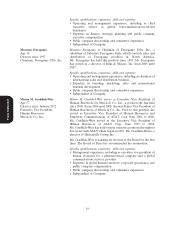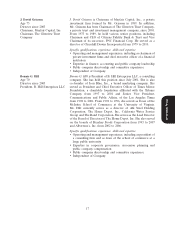Pizza Hut 2011 Annual Report Download - page 26
Download and view the complete annual report
Please find page 26 of the 2011 Pizza Hut annual report below. You can navigate through the pages in the report by either clicking on the pages listed below, or by using the keyword search tool below to find specific information within the annual report.
16MAR201218540977
information and procedures for employees to report ethical or accounting concerns, misconduct or
violations of the Code in a confidential manner. The Code of Conduct applies to the Board of
Directors and all employees of the Company, including the principal executive officer, the principal
financial officer and the principal accounting officer. Our directors and the senior-most employees
in the Company are required to regularly complete a conflicts of interest questionnaire and certify
in writing that they have read and understand the Code of Conduct. The Code of Conduct is
available on the Company’s Web site at www.yum.com/investors/governance/conduct.asp. The
Company intends to post amendments to or waivers from its Code (to the extent applicable to the
Board of Directors or executive officers) on this Web site.
What other Significant Board Practices does the Company have?
•Private Executive Sessions. Our non-management directors meet in executive session at each regular
Board meeting. The executive sessions are attended only by the non-management directors and are
presided over by the presiding director. Our independent directors meet in executive session at least
once per year.
•Role of Presiding Director. Our corporate governance guidelines require the election, by the
independent directors, of a presiding director. Unless the Board provides otherwise, the presiding
director for each calendar year will be the chair of one of our committees that consist solely of
independent directors, who will rotate as presiding director on a calendar year basis. In 2011,
Thomas Ryan served as the presiding director. Based upon the recommendation of the Nominating
and Governance Committee, the Board has determined that the presiding director is responsible
for:
(a) Presiding at all executive sessions of the Board and any other meeting of the Board at which
the Chairman is not present, and advising the Chairman and CEO of any decisions reached or
suggestions made at any executive session,
(b) Approving in advance agendas and schedules for Board meetings and the information that is
provided to directors,
Proxy Statement
(c) If requested by major shareholders, being available for consultations and direct
communication,
(d) Serving as a liaison between the Chairman and the independent directors, and
(e) Calling special meetings of the independent directors.
•Advance Materials. Information and data important to the directors’ understanding of the business or
matters to be considered at a Board or Board Committee meeting are, to the extent practical,
distributed to the directors sufficiently in advance of the meeting to allow careful review prior to the
meeting.
•Board and Committees’ Evaluations. The Board has an annual self-evaluation process that is led by the
Nominating and Governance Committee. This assessment focuses on the Board’s contribution to
the Company and emphasizes those areas in which the Board believes a better contribution could
be made. In addition, the Audit, Management Planning and Development and Nominating and
Governance Committees also each conduct similar annual self-evaluations.
•Majority Voting Policy. Our Articles of Incorporation require majority voting for the election of
directors in uncontested elections. This means that director nominees in an uncontested election for
directors must receive a number of votes ‘‘for’’ his or her election in excess of the number of votes
‘‘against.’’ The Company’s Corporate Governance Principles further provide that any incumbent
director who does not receive a majority of ‘‘for’’ votes will promptly tender to the Board his or her
resignation from the Board. The resignation will specify that it is effective upon the Board’s
8



